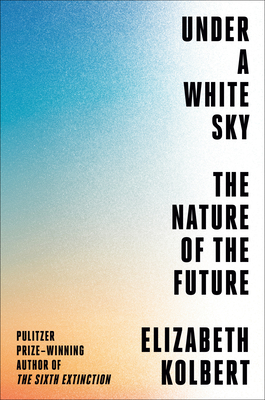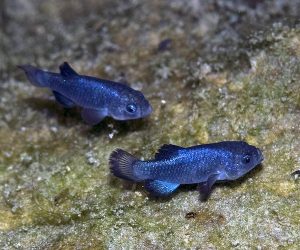Book Review: “Under a White Sky” — Saving Ourselves and Nature
By Ed Meek
Can we correct some of the mistakes we’ve made and engineer our way out of a deadly climate crisis of our own making?
Under a White Sky: The Nature of the Future by Elizabeth Kolbert. Crown, New York, $28.
Buy at Bookshop

Channel 10 Boston recently did a story on “managed retreat from the coast.” The report was sparked by the notion that a quarter million people living in eastern Massachusetts are at risk from rising water as a result of the climate crisis. You might remember that, two years ago, a massive Nor’easter flooded Boston’s streets. Maybe that’s why Elizabeth Kolbert lives in Williamstown, MA. She is the author of the Pulitzer prize–winning The Sixth Extinction, an essential book on traumatic challenges posed to the world by climate change. In that book, she informed us that there have been five previous mass extinctions on earth. It appears as if we are at the beginning of the sixth extinction. This time around, however, we are in what scientists call the Anthropocene period — we are in charge.
Yes, we have taken over the planet. But congratulations are not in order. We have been too successful! We are threatening the extinction of many species, some of whom we depend on for our survival. For example, bees. At the same time, because of developments in agriculture and health care, nearly eight billion of us now cover the surface of the earth. Pumping up fossil fuels has enabled us to thrive. But the price has meant polluting and heating our atmosphere, raising the average temperature by two degrees Fahrenheit. That doesn’t seem like much, until you consider the result of glaciers retreating and massive ice melts at the poles and in the mountains; wildfires in California and Australia; droughts and floods in the Midwest; flooding in New Orleans and Atlantic City and New York and Boston.
Ants are what are called superorganisms. Each ant knows its role and they all work together in the colony. Humans, on the other hand, do not always work well together. We are tribal, and that is one of the major reasons dealing with the climate crisis has been and will continue to be difficult. Nonetheless, there is a growing awareness of the problems we have created and there are attempts to deal with them. Kolbert explores some of those attempts in her new book Under a White Sky: The Nature of the Future. The white sky in the title refers to what happens when, as some scientists propose, we use chemicals and particles to dim the sun in order to cool the earth. Nature and the natural world have been permanently altered. The tragic fact is that there is no returning to the way things used to be. Instead, we now have to intervene if we are going to save ourselves and whatever remains of nature.
Kolbert starts out on the Chicago Sanitary and Ship Canal, which was created in the early 1900s to prevent sewage from the Chicago River draining into Lake Michigan, which provides drinking water for Chicago and is a fishing resource. The canal diverts the water to the Mississippi. The Chicago River is toxic and heavily traveled. But, in this water, weeds and algae get in the way of the boats, so in the ’70s, Asian carp were introduced because they consume weeds and algae. The unforeseen consequence is that the carp were so successful that they took over the river and invaded Lake Michigan and the Mississippi. In response, the entrance to the river has been electrified (via electric barriers) by the Army Corps of Engineers in order to kill the carp.
Kolbert then heads down to Plaquemines at the southern end of the Mississippi, one of the “fastest disappearing places on earth.” Southeastern Louisiana is undergoing a “land-loss crisis.” The Army Corps of Engineers has created canals, a spillway, and levees in order to control the flooding. The area of the Plaquemines “was devastated by Katrina” and then by Hurricane Rita. New Orleans, of course, was nearly destroyed by Hurricane Katrina, which killed 1800 residents and turned the city into a lake. Although New Orleans was high ground when it was founded in 1718, it has been sinking like Venice since.

Endangered pupfish — can they rest easy? Photo: Wiki Commons.
The narrative goes from there to the Mojave Desert, where a rare species of tiny, beautiful pupfish have been saved (as of now) from extinction. Then Kolbert is on to Australia and the Great Barrier Reef, where coral stretches for 135 miles and contains as much as 20 percent of the species on earth. “If there’s a more spectacular place on earth,” she says, “I’m unaware of it.” The outlook for the Great Barrier Reef, as determined by government administrators, has recently declined from “poor” to “very poor.” Nonetheless, scientists are working on a type of coral that is resistant to climate change. Meanwhile, Australia has recently made a deal with an Indian developer for a $16 billion coal mine project.
Kolbert explores two major responses to our fashioning “the nature of the future”: bioengineering and geoengineering. The former includes CRISPR, where scientists exploit their growing ability to manipulate genes. This could be put to good use by eliminating diseases. Perhaps we could use it to develop bodies that are better at processing heat. What could go wrong? Geoengineering involves either removing carbon from the atmosphere or blocking the sun by doing things like spraying aerosol from a plane or launching reflective particles into the sky.
Under a White Sky starts with a reality that too many across the ideological spectrum will not admit: we have already radically altered the world. There is no going back, nature has been ransacked and ravaged. Can we correct some of the mistakes we’ve made and engineer our way out of this crisis of our own making? The disturbing consensus among her subjects: we will have to completely change our lifestyle to achieve zero net energy. And we will have to trust the dictates of science — rather than “anything goes, 1 percent is king, consumer-loving” capitalism — to ensure the planet remains user friendly.
As Bob Dylan sings in “All Along the Watchtower,” “The hour is getting late” — and the wind has been howling for quite a while.
Ed Meek is the author of High Tide (poems) and Luck (short stories).

I will read this, as I did the excellent The Sixth Extinction. Kolbert is a truth teller who sees it as her duty to reveal rather than assuage. I would also like to recommend another grim straight-shooter on what it will take to survive the climate crisis, Roy Scranton on his 2018 essay collection, We’re Doomed, Now What? How do we save the planet? Here is a bit of wisdom from the title piece: